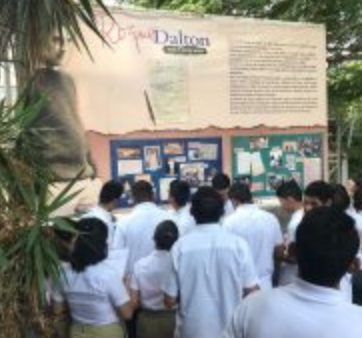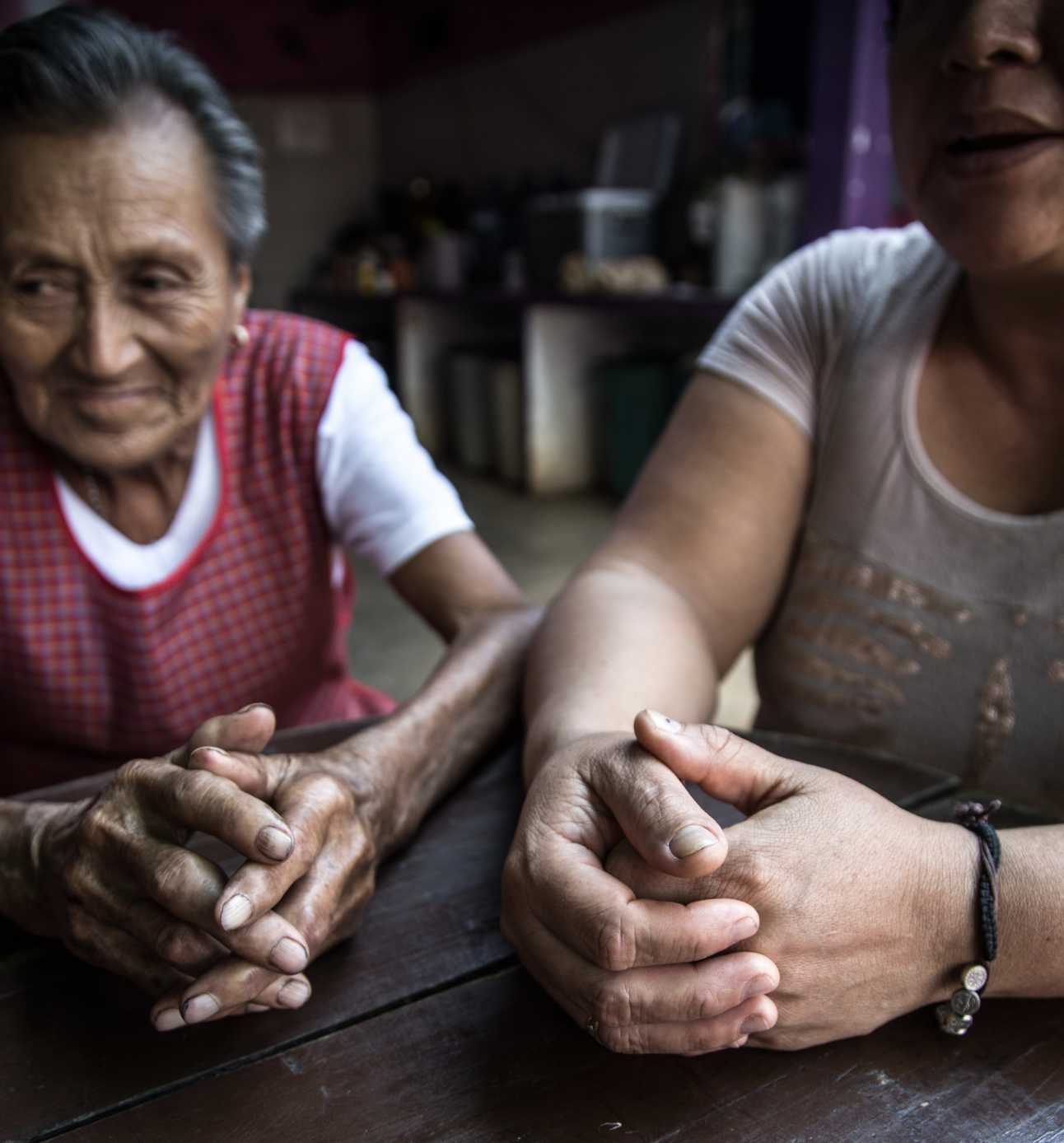Resources
JUMP TO RESOURCe LIST:
News Sources | Photo and Video Essays | Activism | Lessons | Podcasts
Current Events | Books | Digital Collections | Films
News Sources
Below are key sources to keep abreast of current news from Central America.
Contra Corriente is a bilingual "digital journalism site which covers the on-the-ground reality of what is happening in Honduras and Central America . . . with content which helps us to change reality by telling it, analyzing it, and making those in power uncomfortable."
Democracy Now! news archives on El Salvador, Honduras, Guatemala, Nicaragua, and Panama.
The North American Congress on Latin America (NACLA), founded in 1966, provides information and analysis on Latin America.
Washington Office on Latin America (WOLA) promotes human rights, democracy, and social justice in Latin America and the Caribbean.
A regularly updated collection of articles on current events in Central America and Central American immigration. These include stories about the impact on water of gold-mining in El Salvador, myths about refugees, the drug wars, and the situation in Honduras when vice-presidential candidate Tim Kaine was there. See full list.
The Latino Media Collective is a grassroots Latino public-affairs program that airs on Pacifica station WPFW 89.3fm in Washington DC. From the biggest countries in South America to the smallest enclaves in Central America and the Caribbean, no issue or movement for social justice is too small to be spotlighted on the Latino Media Collective.
Photo and Video Essays
When We Were Young There Was a War. This interactive website enlightens and engages students as they learn about the armed conflicts and their aftermaths in El Salvador and Guatemala through the poignant personal stories of Central American adults revisiting their wartime childhoods.
Destiny’s Children: A Legacy of War and Gangs. Powerful photo essays by Donna DeCesare follow the lives of four young people and their families as they deal with the impact of war, gangs, and incarceration.
When Corruption is the Operating System: The Case of Honduras. In some five dozen countries worldwide, corruption can no longer be understood as merely the iniquitous doings of individuals. Rather, it is the operating system of sophisticated networks that cross sectoral and national boundaries in their drive to maximize returns for their members. Honduras offers a prime example of such intertwined, or “integrated,” transnational kleptocratic networks.
Museo de la Palabra y la Imagen. Museum of the Word and the Image, MUPI, is a citizen initiative dedicated to the investigation, rescue, preservation and diffusion of the historical and cultural heritage of El Salvador. The University of Texas and the Museo de la Palabra y la Imagen (MUPI) have archived audio recordings of the historic guerilla radio program, Radio Venceremos, as well as MUPI’s own Tejiendo la Memoria program.
The Right to Grow Old: Honduran Displacement in Mexico. Honduran writer and photographer who documents the stories of Honduran migrants in their journey to the Mexico-U.S. border in an effort to show their humanity. Please note that some content contains violence and sensitive topics for mature audiences.
Activism
CISPES is a grassroots organization dedicated to supporting the Salvadoran people’s struggle for self-determination and social and economic justice.
Witness for Peace is a politically independent, nationwide grassroots organization of people whose mission is to support peace, justice and sustainable economies in the Americas.
Guatemala Commission on Human Rights monitors, documents, and reports on the human rights situation in Guatemala, advocates for survivors of human rights abuses in Guatemala, and works toward positive, systemic change.
SHARE El Salvador strengthens solidarity with and among the Salvadoran people in El Salvador and the United States in the struggle for economic sustainability, justice, and human and civil rights.
The Latin American Working Group connects with activists across the United States and offers tools that they need to expand their ability to influence U.S. foreign policy.
COPINH, Civic Council of Popular and Indigenous Organizations of Honduras is an indigenous organization founded by the Lenca people in March 1993. he organisation promotes the protection of territories and the recognition of the political, economic, social and cultural rights of indigenous peoples in Honduras. Berta Cáceres was a leader within the organization.
Lessons
These websites offer lessons for teaching about Central America. We have not reviewed nor field tested them. Let us know if you use any of the lessons and your feedback.
Explorers, Traders, and Immigrants offers lessons on the cultural and social effects of the global commodity trade.
Living Maya Time: Sun, Corn, and Calendar: This website produced by the Smithsonian National Museum of the American Indian (NMAI) provides lessons and resources to guide the teaching of Mayan cultural concepts, measurement systems, and scientific-spiritual thought. Resources from "Living Maya Time" are a rich addition to math and science classrooms interested in providing diverse perspectives and innovations from the Indigenous peoples of the Americas.
Podcasts
The Rise and Fall of the Panama Canal
In "The Rise and Fall of the Panama Canal," Throughline podcast host Gene Demby speaks with historical novelist Cristina Henriquez about the impact on the people of Panama, immigrant laborers, and the climate when the land was divided in two. Aired April 17, 2024.
Mexican Officials Attempt to Stop Migrant Caravan, Indicative of U.S. Pressure on Mexico. In this short episode of "The Takeaway", coverage is given on a migrant caravan that has traveled through El Salvador and Honduras with the goal of reaching the U.S.-Mexico border. However, one of the many obstacles faced by the caravan is the Mexican National Guard. The episode questions the role that Mexico plays in enforcing the United States' immigration policies by proxy. This resource assumes viewers have some knowledge around the Mexican migration politics. If students are new to the topic, supplement the podcast with introductory articles on immigration. Aired 1/22/20.
Throughline "There will be bananas." Throughline is a podcast dedicated to exploring the connections between the past and present. In this episode, "There Will Be Bananas," hosts Ramtin Arablouei and Rund Abdelfatah unearth the troubling history of how bananas became a staple fruit in the U.S. diet. The episode is divided into three parts. First, it follows the life of Minor Cooper Keith and his ruthless ambition to build a railroad in the Costa Rican rainforest. Second, it teaches listeners how the banana went from a taboo fruit to a common household food. Third, light is shed on the relationship between United Fruit Company and Latin American governments, hence the title, 'banana republics.' Aired 1/9/2020.
The 1954 Guatemalan Coup Part 2. Part 2 of the podcast goes in depth about the involvement of the United Fruit Company and conflict of interests that were supported by the CIA. It is highly recommended that The 1954 Guatemalan Coup Part 1 is played first to make sense of this episode. Aired 9/11/19.
The 1954 Guatemalan Coup Part 1. If you're looking for a history lesson on the overthrow of Guatemala's democratically elected government in 1954, this part 1 of the podcast is a great supplement to understand the historical context of the United States's foreign policy, such as Sphere of Influence and Good Neighbor frameworks. This podcast does an excellent job of providing context for anyone that is new to Guatemala's history. Aired 9/9/19.
Climate Change Meets the U.S. Border Crisis. This episode of Trumpcast focuses on how climate change is a push factor in people's decision to migrate by educating its audience on how weather patterns makes people more vulnerable economically. As the issue of climate change threatens the world, the theme of climate refugees is one that continues to be largely unexplored. This episode is friendly to all audiences, regardless of content knowledge on the topic. Aired 4/13/2019.
Archbishop Oscar Romero. In this short episode, the murder of Oscar Romero is discussed in an interview with a journalist who witnessed his death. Beyond his death, the legacy that Romero left behind is talked about with the consecration of a saint status. It is recommended that this podcast be accompanied with additional reading or viewing of the film Romero. Aired 10/12/18.
Under the Shadow. This investigative podcast series takes listeners across Latin America to the scenes of some of the region’s most devastating, revolutionary, and historic moments. In Season 1, independent journalist Michael Fox dives deep into the past of Central America, uncovering the history of U.S. intervention and its lingering effects in the region today.
Digital Collections
The Archivo Histórico de la Policía Nacional de Guatemala (Guatemalan National Police Historical Archive, or AHPN) aims to facilitate scholarly and legal research into a vast cache of historical documentation about Guatemalan history. This site currently includes around 20 million scanned images of documents from the AHPN, of an estimated 80 million total. This site is intended for adults and higher education.
Central American Historical and Ancestral Society of California. This website showcases Central American related historical documents, artifacts, and photographs with a particular emphasis on the impact of Central Americans on California.
Duelo: Memorias de una Invasión: An interactive website from Revista Colon including a timeline of the 1989 U.S. Invasion of Panama and nine chronicles by journalists detailing the experiences of those who survived and died during the invasion. Each chronicle includes artwork by Latin@ artists who further explore the themes discussed in each chronicle through their artwork. This is a Spanish-language website, but built-in Google features can adequately translate the website into English.
Panama and the Canal Collection from the Digital Library of the Caribbean: A collection of resources ranging from newspapers, books, scholarly articles, photographs and mixed materials about Panama, the Panama Canal, and the Canal Zone. Most of the materials are provided by various projects at the University of Florida.
The Sandino Rebellion: A Documentary History. An open-access digital archive of the Sandino Rebellion in Nicaragua, 1927-1934.
Unfinished Sentences Testimony Archive. This archive is composed of oral histories shared by 48 people who were residents of the community of Arcatao, in the department of Chalatenango, El Salvador, during the period of the Salvadoran civil war.
































